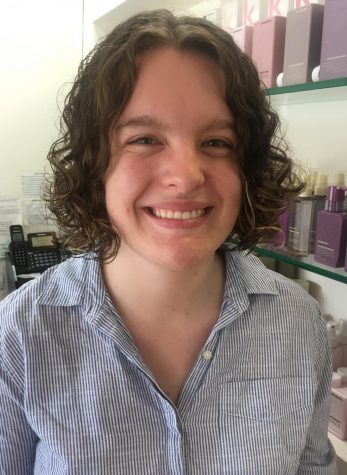ETHS alum, Pulitzer winner reflects on career

Photo courtesy of Marieclaire.
May 24, 2018
Megan Twohey is known for her pulitzer prize winning work on the Harvey Weinstein scandal, but Twohey, now an investigative journalist with the New York Times, had humble beginnings right here in Evanston.
While at ETHS from 1990-1994, Twohey says she took the Intro to Journalism class and wrote a few articles for the Evanstonian, but wasn’t on the staff.
Rodney Lowe, who was the journalism teacher at the time, invited Twohey back to ETHS last year to speak with the Intro classes and the Evanstonian staff.
“It was really interesting to hear about her experience as a journalist, and the stories she covered were really cool,” sophomore and Evanstonian staff member Meredith Herrick says.
Twohey graduated from Georgetown 1998, majoring in American Studies. She then joined the Chicago Tribune in 2008 and was there drawn towards investigating cases of sex crimes and misconduct.
“Once I started reporting on it in earnest, in Chicago, I had a hard time looking away,” Twohey explains. “I continue to gravitate to- ward that issue because not only were the underlying crimes so outrageous, but I was also repeatedly infuriated by the failure of institutions that were designed to protect women.”
In 2009, she published a piece for the Tribune on the large number of untested rape kits from Chicagoland police departments. The next year, Illinois became the first state to require all rape kits to be tested, and many states followed suit. Twohey says that she was not surprised by the impact that story had.
“I suspected that once the truth came out about these untested rape kits, not just in Illinois but across the country, other states and ultimately Congress would have to respond with serious reforms,” she says. During 2010 and 2011, Twohey investigated and wrote a series of pieces on sexually abusive doctors in Chicago. In the course of her reporting, Twohey discovered not only the extensive abuse many doctors committed, but also the failure of law enforcement and the Illinois Department of Financial and
Professional Regulation to effectively punish and prevent further abuse. This series of stories led to a state law that forced doctors with sex crimes convictions to lose their medical license.
“I saw in journalism an opportunity to help bring about change, that investigative reporting can actually lead to reforms and help right wrongs and deliver delayed justice. The more I started to get a taste for that over the course of my career, the more hooked I was,” Twohey says.
In 2013, Twohey published an investigative report for Reuters on an underground market that was being used by parents to abandon their adopted children. She was a finalist for a Pulitzer Prize for this work.
After joining the New York Times investigative team in 2016, Twohey and her reporting partner, Jodi Kantor, published an expose on the decades of sexual abuse and harassment perpetrated by Hollywood producer Harvey Weinstein.
“There had long been rumors about Harvey Weinstein being a sexual predator in the entertainment industry, and we really saw this as a moment to dig into that and to see… if there was a pattern of misconduct that we could uncover,” Twohey says.
The response to Twohey and Kantor’s reporting was immediate, with the #metoo movement gaining popularity and Weinstein being fired just days after the publishing of their first article.
However, Twohey and the other reporters on the Weinstein story didn’t predict the sort of reaction their first story got and, according to Twohey, the team “put their heads down and kept reporting.”
“We felt like it was really important to work to report as full a picture as possible. Not only about what he had done, but about the individuals and institutions that had enabled his predatory behavior over the years,” Twohey says. “So even as the work helped to ignite this reckoning on sexual assault, we continued to keep our heads down and continued working around the clock.”
There was a moment, Twohey says, when she realized the gravity of the Weinstein story’s impact. While scrolling through Facebook one night, taking a break from reporting, Twohey saw the metoo hashtag “all up and down” her feed.
“I had friends and family members who were using the metoo hashtag to share their personal experiences, and it just brought tears to my eyes,” she adds. “It was one of the first times where I got the sense that there were some substantial ripple effects, and that this was playing out at a scale that we never could have imagined.”
Twohey and Kantor won a Pulitzer prize for their work, and were named two of TIME’s 100 most influential people of 2018.
A question that remains to be seen however, says Twohey, is whether our society is making genuine progress on the front of sexual harassment and assault.
“That’s why it’s really incumbent on reporters to continue to cover this issue, and report through this movement and see if there are systemic changes that ensure that not just women, but everyone is adequately protected in the workplace,” Twohey adds.
Twohey and Kantor are currently writing a book on their experiences reporting on the Weinstein scandal.
“[The book] will allow us to continue reporting on not just Weinstein, but the broader issues of sexual harassment and sexual assault that have come to light over the past year,” Twohey explains.










